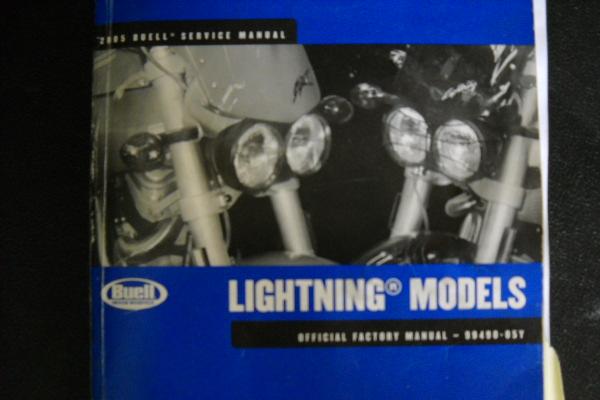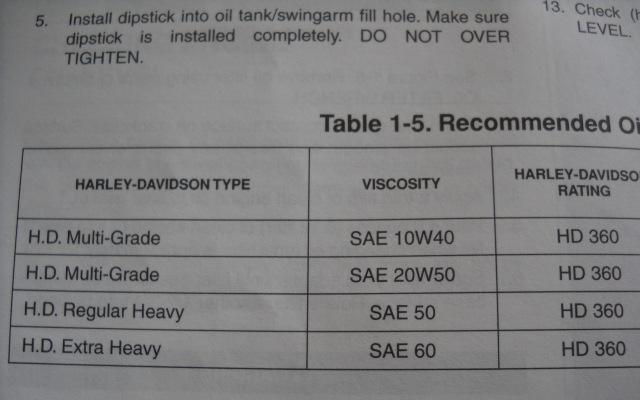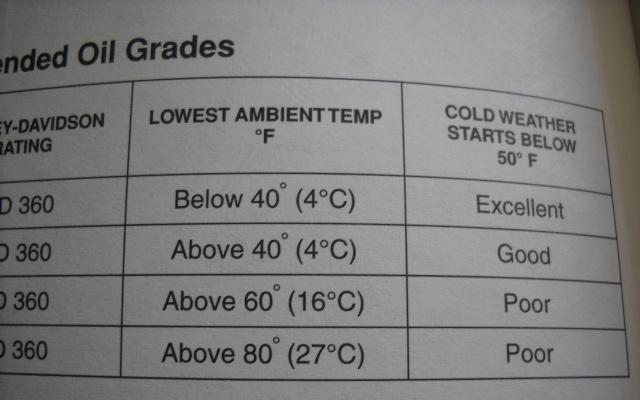| Author | Message | ||
Electraglider_1997 |
Who is using it and are you using it in hot weather climates? I'm just interested in finding a less expensive alternative to Mobil 1 15W50 and 20W50. | ||
Nobuell |
Why would you want to use 40 weight oil during the summer? | ||
Electraglider_1997 |
I think some are using it. It's diesel rated. Ideally it would be 50W. | ||
Tstone |
Electraglider, Yes (from the GPS thread). I use it in every gas engine I own. My motorcycle situation is a little different than a lot of people though. I live in a small town where there's no traffic - so my bikes don't ever sit and cook at stop lights or in traffic. I seldom ride two-up, and I don't usually ride in the super hot midwestern weather. About 95 degrees is it for me. I think if I were to change any of the above I'd go with the 50 weight. I will have to say though...cars, dirtbikes, streetbikes, lawnmowers, oil squirt can, etc - nothing I've ever used the oil in has ever shown any sign of engine deterioration. And I'm cheap. I run my stuff for ever. | ||
Hughlysses |
Craig- check the forum at www.bobistheoilguy.com. You can probably find some hard data (i.e.- used oil analyses) from people who have been using it in air-cooled motorcycles. That will show how well it holds up in the application. | ||
Etennuly |
I use the Rotella non-synthetic. I switched to it when HD decided they had to have $11.50 per quart for their straight weight dino oils. Hugh can probably tell you why I prefer non synthetic oils. I have been trying to stick with the Buell Service Manual for what oil and when. And yes, in temperatures perpetually above 75 degrees I will run 60W when I can find it. | ||
Electraglider_1997 |
Great stuff guys, that's feedback that I'm looking for. Thanks. | ||
Electraglider_1997 |
Vern, I went to http://www.bobistheoilguy.com/motor-oil-102/ as Hugh suggested and have begun reading the very enlightening "Motor Oil University". Most engine wear seems to occur while the engine is warming up. The thickness or viscosity of the oil when it is at ambient temperature seems to be of vital importance. A 0W50 oil would probably be better for an air cooled engine than a 20W50 oil because the flow would be way better at startup thereby reducing wear during the warm-up. A 60W oil might be way to thick for protective flow at start-up even though great once the engine is at operating temps. | ||
Electraglider_1997 |
Vern, Read this http://www.bobistheoilguy.com/motor-oil-104/ Assuming this guy knows what he is talking about, the use of 60W dino oil should be the last thing you should use. It's flow at startup would we non-existent and it's protection at operating temp would be statistically no better than even 30W. | ||
Etennuly |
This is an oil thread.....I have been sucked in!  You know how people become inflamed by oil threads! You know how people become inflamed by oil threads! Your man says in his article: The oil companies and engine manufacturers work together very hard to give you the product you need. I cannot argue with you about this stuff. I guess I have been foolishly mislead by these guys!     Damn ya can't trust anyone these days!  Oh, and so many times I have heard new or near new Buell engines sound like a rock tumbler on crack. Two in particular I changed oils in. Put them back to non-synthetic and they were so much quieter. Hugh at one time mentioned an expert talking about bearing skip with synthetic oil. Something about potential bearing failure.....but I don't know.  | ||
Nobuell |
Bobistheoilguy has a lot of good info. However, most of his references in Oil 104 are based on water cooled car engines with mostly plain bearings and very consistent operating temperatures. I do not know if it is a fair comparison since most of our bearings are rolling element especially in the high load areas like the rod ends. The rolling element bearings do not rely on the oil pressure to preclude metal to metal contact to the same degree as a plain bearing. I would think that wear induced due to low starting pressure is not as much of an issue with our motors. Our air cooled motors will have wide swings in temperature mainly towards the high side, especially during the summer. I would think that the high temperature flow characteristics would be more important for our engines. The one thing I know for sure is seat of the pants experience would not provide me with an adequate reason to change from the OEM recommendation for the high temperature viscosity rating. The low temperature rating is another story as described in the article. I will stick with a reputable MC based synthetic. The cost difference over the course of the riding season is not worth the risk to me. | ||
Electraglider_1997 |
I graduated from Motor oil University. I learned that storing oil in a unheated garage, like I always have, degrades the oil. Also it is usually better to go down a weight grade than up. I think I will try Rotella and not worry that it is too thin. It will protect better at startup and no worse at operating temp if all that I learned is gospel. | ||
Tstone |
Just thought I'd mention...If anybody's worried about startup and 20W50, Castrol makes a 10w50 synthetic, and I believe it meets the new JASO spec. If memory serves, Castrol had a picture of an air cooled Multistrada on the page with the 10w50 specifications. (Message edited by tstone on July 05, 2011) | ||
Etennuly |
In the summer time here in East Tennessee for nearly every engine I own, there is little warm up time. I can get in my Tahoe at 10:30 am and the temp gage will already be near 100 degrees F. Therefore, following the SM chart to the 60W for summer use is not out of range for my Buell at all. I watch the weather forecasts for my area. When the cool temperatures of the days are mid 60'sF and up, where the daily highs are above 90F, I run the straight 60W. I very seldom get out at five am to start the bike at the low mean temperature. Most of the time I start riding with the temps in the 80's. | ||
Etennuly |
The higher viscosity number in our V Twin oils is to help carry heat away from the heads. I feel the opposite is true of what the man says in his article about going to a lower viscosity number rather than a higher one. He is looking for cold start wear characteristics, we are looking for the oil to cool high temperature partially enclosed air heads. A compromise is needed on our engines. Give up a little cold start wear(we have ball bearings vs flat babbit bearings) to save the top end from destructive heat. IMHO the larger molecular structure of the dino oil is better at carrying heat to the oil cooler than that of the thinner syn oil. That is in part of why the book says to run 60W when the temps are in the 90's. | ||
Reepicheep |
I tried the Castrol full synthetic 0W50 or 5W50 (can't remember which) because it was on sale at my local auto parts store... Worked fine, but my XB9SX would drink it like crazy, over a quart in 2000 miles. Switching back to 20w50 full synthetic, and the "oil consumption problem" suddenly disappeared again. So now I just use the cheapest full synthetic 20w50 or 15W50 I can find, and change it before 4000 miles. Based on real tests I have seen with non synthetic oil in an air cooled motorcycle, non synthetic oil is significantly degraded in under 2000 miles. I change the oil in my KDX-200 every ride, sometimes two or three times during the same ride if I am going really far.  | ||
Nobuell |
The Bobistheoilguy data seems correct to me. Bob references 10 cSt as the optimum viscosity for a running engine. The problem I have is the known operating temperature of the oil in the Buell engine. I currently run Redline 20W-50 MC oil. The manufactures data sheet shows the viscosity to be 18.6 at 212 deg F. What will the viscosity be at our operating temperatures? Will it go below the theoretical 10 cSt? I do not know! I do know that experimenting with different oil viscosity in an automotive engine that operates at a consistent temperature will be much different than with our air cooled motors. I do not believe an informed decision can be made without having accurate oil temperature data and oil viscosity information at those temperatures. My guess is the manufacturer errors on the side of adequate viscosity at high temperature due to the many operating variables and is less concerned with startup wear because of the rolling element bearings. Does anybody have accurate oil temperatures plotted against ambient temperature and RPM? I would bet BMC does (or did) and based their recommendation on that data. The other day I was stuck in a long stop and go traffic jam. The air temperature was >95 degrees. I do not know the temperature of the oil but the motor felt hottttt! I feel more comfortable having the 20W-50 Redline oil with the extra wear components they have. Once again it is worth it to me. | ||
Etennuly |
I had an 'o5 City-X that on one hot summer weekend consumed a fresh oil change of oil. I had some 20-50 left over so rather than a trip to HD for the 60W I put in the 20-50. As I was returning from a 500 mile two day trip the oil light came on. I was coasting distance from my driveway, so I shut it off and coasted home. Diagnosis.....no oil! The tank was empty! No leaks, just gone. I poured in two quarts of 60W and it never went away again. I went back to the chart in the SM and never had that problem again. | ||
Electraglider_1997 |
Vern, I think you missed the hole the first time. | ||
Electraglider_1997 |
As explained in Motor Oil U the oils get way way better each time they change the letter specification. Oils made in 2006 can't match 2011 oil specs. It used to be that 10W40 was the oil of choice for most cars and now they are recommending 0W30. | ||
Etennuly |
It is not only the oils that are changing. The engines are being made to start out with, and specifically run with synthetic oils. As is the case with Corvettes from the 1994 LT1 which was spec'd with Mobil 1 from day one. No break in oil necessary. A lot of these newer engines are more efficient because they can be made with tighter fitting moving parts because of the thinner slipperier oils. Old engines had to have larger clearances and wear in room, in part because the old waxy oils could not survive the closer tolerances. I grew up with 1960's Chevy V8s that wore to the point of needing bored at 60,000 miles. I have torn down engines from the early 2,000's that had over 150,000 miles with almost no cylinder or ring wear. Synthetic oils do a great service for helping fight engine emissions and wear. Some engines were developed before the synthetic oil era and don't seem to benefit the same way from them.(again this is IMHO) What engine does your bike have in it? | ||
Gunut75 |
I run 15-40 Ford diesel oil in my XB changed at every 2000-3000 miles. The bike consumes about 100-150ml during that time. When I bought the bike (with about 5k miles) it used 1 quart every 2000 miles. I got all the paperwork from the previous owner, and it never had anything but synthetic. Once I put the dino oil in, it pretty much stopped the oil burning problem, and the bike runs fantastic with 22,000 on the clock. I think that the rings were not fully seated when I bought the bike. It still uses less and less oil every change to this day. I am considering amsoil the next oil change. If the valves are louder, I will go back to my 15-40. If it's quieter, I will try it out for a while. | ||
Mnviking |
I had the opportunity to ask EB himself what oil he recommends in his motors. Amsoil. 'nough said for me. He still uses that in his new Erik Buell Racing bikes. I run the 20w50 from late spring on to fall and 10w40 during the winter months. | ||
Mark_weiss |
More oil info: http://www.calsci.com/motorcycleinfo/Oils1.html | ||
Reepicheep |
So, will somebody be selling Amsoil at Mid Ohio? If they are selling, I am buying. | ||
Etennuly |
Of course EB runs Amsoil. They are one of his sponsors  . He is now biased. But it makes no difference to us Uly riders. His racing stuff is all water cooled. We are still running air heads. . He is now biased. But it makes no difference to us Uly riders. His racing stuff is all water cooled. We are still running air heads. WE DON'T NEED MORE OIL INFORMATION! I AM RIGHT AND THAT IS ALL YOU NEED TO KNOW!!!!!!   | ||
Blake |
I always enjoy these discussions.  I don't have all the answers and have learned a LOT by participating in them. The mechanical engineer in me like to think it knows it all on such subjects, but that is never the case. I don't have all the answers and have learned a LOT by participating in them. The mechanical engineer in me like to think it knows it all on such subjects, but that is never the case.  Craig (Electra-Glider), How would the oil flow provided by an engine oiling system that employs a positive displacement oil pump ever come close to being "non-existent"? Vern (ETenUly), Higher viscosity grade oil would seem to provide inferior cooling to the heads as the oil wouldn't flow as well compared to a lower viscosity grade. But again, the oil flow rate being governed by the positive displacement type oil pump, the flow rate should be similar' just more pooling of oil so to speak for higher viscosity, so maybe there is no significant difference in cooling. The old Hal's Racing bikes in AMA Pro Thunder used a W30 weight Mobil 1 oil. The higher the viscosity grade, the greater the parasitic loss due to viscous action, so they ran as low as they could get away with. I'm pretty sure that the reason the owner's manual recommends straight viscosity grade conventional oils for higher ambient temperatures is that the straight grade oils suffer far less degradation due to high heat than a multi-viscosity conventional oil. The absolute worst oil you can use in that respect is a 10W40 conventional oil as it requires the greates amount of viscosity modifier additives. The viscosity modifiers needed to achieve the multi-vis performance begin to break down quickly when exposed to high temperatures. A straight grade conventional oil does not contain those multi-vis additives and so won't break down so badly in hight temperatures. Synthetic oils typically don't need any viscosity modifiers/additives even for amazing multi-vis performance like 5W50 and the like. The synthetics are inherently much more stable and robust in high temperatures, not to mention superior in almost every other measure as well. The synthetics have the larger molecules (chains), they expand with increasing temperature and contract as the oil cools. Vern's information is interesting. I'll be switching from my Mobil 1 15W50 to Amsoil. I don't think that engine noise is a good indicator of better lubrication. Tar or sawdust will quite an engine quite effectively. (Message edited by blake on July 06, 2011) | ||
7873jake |
Running 0w30 Mobil 1 in the wife's Honda (car) made it the noisiest I've ever heard that little 4 cyl (ran it for the winter months). Moved back to the spec'd oil and it is muuuch quieter now. Given that, I agree with Blake- I don't think that (lack of) engine noise is a good indicator of better lubrication. I know the Honda was well protected, just noisy. Personally, I like the old Sopwith Camel system of lubrication: castor oil in a total loss lube system. Not only did it work, it also kept the operators 'regular' if not a little too active! http://www.canadianflight.org/content/the-sopwith- camel | ||
Blake |
It is also interesting to note that a higher viscosity oil will generate significantly more heat due to its greater parasitic viscous losses (viscous friction). | ||
Blake |
I think that may be the root of the myth that higher viscosity oil removes more heat. Folks see higher oil temperatures and think it must be removing more heat from the engine when in truth the thicker oil is generating more heat. |